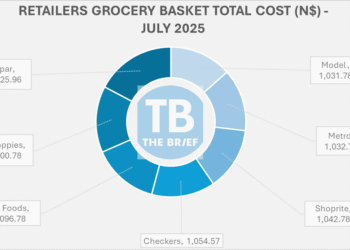
Epangelo Mining Company says the government should move swiftly and enact a policy that will allow it to get at least 10% of all mining exploration licences issued in the country.
The State-owned mining company’s Chief Executive Officer, Eliphas Hawala, told The Brief that the policy, which was approved by Cabinet in 2011 but is yet to be enacted into law, will strengthen Epangelo’s balance sheet and operations.
Hawala said the new policy was taking too long to be implemented due to various schools of thought on the issue.
 “Some people are saying exclusivity might be against sections of the country’s constitution, as everybody has rights to the minerals,” he said.
Hawala, however, said exclusivity does not mean others are excluded from getting minerals.
“The constitution says the minerals belong to the state. Before you give them to someone you must leave something for the State. However, what is happening is that when one gets a prospecting licence, they get 100% rights to the minerals from the state and when the state says give us 10% in situations where money is exchanged, the state has to buy it back.â€
Namibia currently has the same law that empowers the National Petroleum Corporation of Namibia (Namcor) to automatically receive a 10% equity in all oil and gas exploration activities taking place in the country.
When it comes to revenue generation by the mining company, Hawala said, “the difference between Namcor and Epangelo is that Namcor receives levies, and it has the money to make minimal contributions for explorations. On the other hand, we fund explorations through getting into joint ventures as well as with the money we get from the fiscus.â€
Quizzed on the company’s mining portfolio, he said: “We want a diversified portfolio so that when uranium prices are down, gold prices might be at the top.â€
He said the company was gearing up to start conducting its own explorations for uranium, amid an expected rise in global demand.
“We have licences for uranium. We have some in Erongo.We are applying for an environmental clearance [certificate] for all our EPLs,†the Epangelo CEO told The Brief.
Spot prices for uranium have more than doubled from lows of US$28 per pound last year to US$64 in April, sparking a fresh interest in restarting projects set aside after a 2011 earthquake and tsunami, which crippled Japan’s Fukushima nuclear power plant.
Uranium prices began to rise in mid-2021, as several countries seeking to limit climate change decided to move back to nuclear power as a source of carbon-free energy.
John Ciampaglia, CEO of Sprott Asset Management, which runs the Sprott Physical Uranium Trust, forecasts uranium could hit US$100 per pound in the long run, with prices having once peaked at around US$140 per pound in 2007, according to Reuters.
Namibia currently has only two mines producing the nuclear fuel РR̦ssing Uranium Mine and Husab Uranium.
Epangelo is a government-owned entity, whose main activities are exploration, mining, beneficiation, mineral processing, trading of minerals and financing of businesses.
Â











